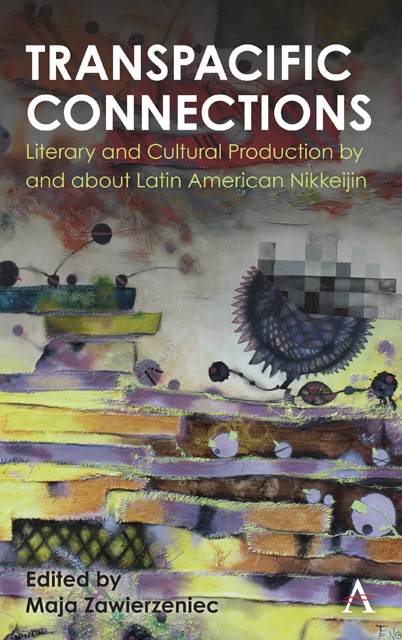Book contents
- Frontmatter
- Contents
- Notes on Contributors
- Introduction
- Chapter 1 The “Japanese Community” in Brazil and its Literary Production: The Functioning of “Death” in Matsui Tarô’s Literary Fiction
- Chapter 2 Contested Modernities: Representations of the Brazilian Dekasegi and the Nipponization of Brazil in Nikkei Cultural Production
- Chapter 3 When Gustave Flaubert Meets Ryūnosuke Akutagawa: “Corazón Sencillo” by Augusto Higa Oshiro. The Short Story of a Peruvian Nikkei Writer
- Chapter 4 Japanese Prints in Tablada’s Writings: Cultural and Media Transposition in ‘El poema de Okusai’
- Chapter 5 The Telenovela Oyuki’s Sin (El Pecado De Oyuki): Las Realidades Del Otro or Mexico through A Japanized Lens
- Index
Chapter 5 - The Telenovela Oyuki’s Sin (El Pecado De Oyuki): Las Realidades Del Otro or Mexico through A Japanized Lens
Published online by Cambridge University Press: 09 December 2022
- Frontmatter
- Contents
- Notes on Contributors
- Introduction
- Chapter 1 The “Japanese Community” in Brazil and its Literary Production: The Functioning of “Death” in Matsui Tarô’s Literary Fiction
- Chapter 2 Contested Modernities: Representations of the Brazilian Dekasegi and the Nipponization of Brazil in Nikkei Cultural Production
- Chapter 3 When Gustave Flaubert Meets Ryūnosuke Akutagawa: “Corazón Sencillo” by Augusto Higa Oshiro. The Short Story of a Peruvian Nikkei Writer
- Chapter 4 Japanese Prints in Tablada’s Writings: Cultural and Media Transposition in ‘El poema de Okusai’
- Chapter 5 The Telenovela Oyuki’s Sin (El Pecado De Oyuki): Las Realidades Del Otro or Mexico through A Japanized Lens
- Index
Summary
Introduction
The history of the Japanese-Mexican relations, both political and cultural, has still been relatively little analyzed. In this context, the Mexican once-famous telenovela from the late 1980s, Oyuki's sin (broadcast from 15 February to 5 August 1988), is an interesting pretext to approach a variety of topics related to contemporary Mexico. It has been almost completely forgotten both in academic investigations concerning Mexican telenovelas as well as in the works focused on sociocultural relations between Mexico and Japan and its mutual connections (a topic per se practically nonexistent in European investigations), although it still has its fans, who recall it on a few internet fora.
The telenovelas are undeniably the most popular television genre in Latin America. They communicate ideological meanings and represent culturally specific elements. However, through analyzing this particular and peculiar telenovela, it is possible to address not only the topic of the Mexican multiculturality and its great diversity, but also above all a series of social and cultural aspects concerning Mexican society and mentality, such as national stereotypes, racial problems, national characteristics (the “Mexican character”), linguistic peculiarities of the Mexican Spanish (sic!), as well as the situation of women in Mexico.
First of all, there is much more cultural diversity in the United Mexican States than most people are aware of. Apart from large indigenous communities, several other ethnic and cultural groups have contributed to the Mexican pluriculturality. There are, among others, Russians and Ukrainians, dissidents of the Russian Orthodox Church, whose immigration began between 1905 and 1906; there are Lebanese, who came to Mexico at the end of the nineteenth century and in the mid-twentieth century, now more than four hundred thousand, in almost all parts of the Republic; the French, known especially by the Barcelonnette immigration from the beginning of the 1821. There is also a noticeable Japanese community, which officially started when the first Japanese immigrants arrived in the Southern Mexican state of Chiapas in 1897.
Second, although Latin American telenovelas, including the Mexican productions, are the flagship export popular culture product of the region, very few foreigners know of the existence of the Mexican telenovela Oyuki's sin, a production “set in Japan,” which actually was recreated in the Ajusco zone of what was called until very recently Distrito Federal (currently, la Ciudad de México).
- Type
- Chapter
- Information
- Transpacific ConnectionsLiterary and Cultural Production by and about Latin American Nikkeijin, pp. 81 - 96Publisher: Anthem PressPrint publication year: 2022



